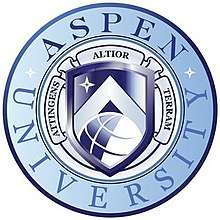Aspen University
Aspen University is a United States-based private, for-profit, nationally accredited distance-learning university that was established in 1987. Aspen University offers undergraduate and graduate degrees in nursing, education, computer science, technology, information systems, business, project management, counseling, and criminal justice. Aspen Group, Inc. is a publicly held, for-profit post-secondary education company headquartered in New York, NY. and owns two accredited universities, Aspen University and United States University. Aspen Group's vision is to make college affordable again in America.
 | |
| Type | For-profit online university |
|---|---|
| Established | 1987 |
| Budget | $5.0 million[1] |
| President | Cheri St. Arnauld, EdD |
| Students | 3600 |
| Location | , , |
| Website | https://www.aspen.edu |
| Traded as | NASDAQ: ASPU Russell Microcap Index component |
|---|---|
| Founded | 1987 |
| Headquarters | |
| Website | www |
Aspen Group, Inc. is publicly traded under the symbol NASDAQ: ASPU, and had $4.2 million in revenue in the 2017 fiscal year.[2]
Mission
Aspen is dedicated to offering any motivated college-worthy student the opportunity to receive a high quality, responsibly priced distance-learning education for the purpose of achieving sustainable economic and social benefits for themselves and their families.
History
Foundation
The University was founded during the 1960s as the International Academy. In 1987, the International Academy established the Information Institute and changed the school's name to the International School of Information Management (ISIM), focusing on emerging information technologies. In 2003, ISIM changed its name to Aspen University.
Accreditation
Aspen University is accredited by the Distance Education Accrediting Commission (DEAC).[3] The Distance Education Accrediting Commission (DEAC) is listed by the U.S. Department of Education as a nationally recognized accrediting agency, and is a recognized member of the Council for Higher Education Accreditation (CHEA).
The baccalaureate and master's degree in nursing at Aspen University is accredited by the Commission on Collegiate Nursing Education (http://www.aacn.nche.edu/ccne-accreditation).
Aspen University has been reviewed and approved as a provider of project management training by the Project Management Institute (PMI).[4]
Aspen University's Bachelor's & Master's degrees in Psychology of Addiction and Counseling are approved by the National Association for Alcoholism and Drug Abuse Counselors (NAADAC).[3]
The Colorado Commission on Higher Education (CCHE) has authorized Aspen University to operate in Colorado as a private university under the Degree Authorization Act.[4]
Aspen University in not regionally accredited, and thus degrees gained there may not be as widely accepted or transferable [5]
Some careers and career licenses absolutely REQUIRE a regionally accredited degree. Generally, colleges with the same type of accreditation accept each other's courses and degrees. If a student attends a non-regionally accredited college, the majority of regionally accredited colleges will not accept that they have a "real" degree. For example, if they want to gain a master's degree, or work in a job that requires an undergraduate degree from a regionally accredited university.[6]
Academics
The school offers degrees at various levels in Psychology and Addiction Counseling, Medical Management, various specialty degrees in Criminal Justice, Nursing, Early Childhood Education, Education, Business Administration, Information Management, Information Systems, Information Technology and Computer Science.
External links
References
- https://ir.aspen.edu/income-statement
- https://ir.aspen.edu/income-statement
- http://directorysearch.deac.org/school/detail.aspx?schoolid=175%5B%5D
- https://ccrs.pmi.org/search/activities?sf=Activities&kwd=aspen+university
- https://www.edsmart.org/regional-vs-national-accreditation/
- https://www.geteducated.com/diploma-mill-police/degree-mills-list/aspen-university-accreditation